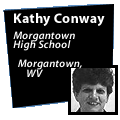A
Letter to Teachers
Teachers,
I am excited about using
the Water Quality modules in my Chem Tech classroom next fall. Traditionally,
the textbook has been my major source of information for the students.
I believe that this module will be a great way to get my students
involved in integrating technology with science. In the spring of
1996 my students worked through a couple of the Exploring the Environment™
modules and the positive feedback from them was overwhelming. Many
cited it as one of the most worthwhile science experiences they
had had in high school. To quote from a couple of students who used
the ETE modules, "..I actually looked forward to coming to
class even though it was first period." "The modules are
interesting and give even more variety to the class......I like
the real life ideas. I like the computer."
A biology teacher and
I hope to collaborate using the Water Quality Module. For some time
we have tried to find a way to integrate the Stream Ecology unit
in her class and the Chem Tech Water Quality unit in my class. This
looks like a viable solution. It's already on-line and it is problem-based
learning, something we both want to see in our classrooms. We are
looking forward to teaming and getting our students to work together.
We both believe that there is a need for students to make connections
between the sciences and between science and community (real life)
applications.
I have written several
Chem Tech labs that will integrate nicely with this unit. I plan
to introduce these to reinforce the concepts in the module. Labs
on electrolytes, pH, water hardness and water properties parallel
this module. The ChemCom text has a Foul Water Lab and a Water Testing
Lab that will serve to connect text to module.
As part of the biology-chemistry
collaboration we plan to have our students actually perform some
of the tests conducted in the module. My students will work on the
chemical and physical characteristics (pH, dissolved oxygen, conductivity,
temperature, etc.) while the biology students will collect macroinvertebrate
information. The classes can then share data and compare biological,
chemical and physical characteristics of the stream.
The problem-based learning
experiences that the modules offer my students involve issues that
get them hooked. Students are doing research and becoming more scientifically
literate.
I have students who are
not science oriented and who do not intend to major in the science
in college. Several are interested in film production, writing,
art, etc.. I hope to have these students produce assessment products
for the evaluation section of the modules that will allow them to
use their artistic talents. Recently two students produced their
own films to summarize what they had learned about an issue. Other
students wrote plays to set up real life scenarios to explore problems.
Two wrote children's books on the topics and took the books to the
local elementary schools. I have many reasons for wanting to expand
on this type of evaluation as an end-product in the water quality
unit, but the major reason is the expression on the students' faces
when they are proud of what they have accomplished.
Finally, I find that
this Water Quality module and the other modules I have used have
the potential to enhance some of the work I am trying to do in regards
to integrating other disciplines, (e.g. history, math and English)
into science. Sections of the module on Environmental History ,
data and graph analysis, and module writing elements have excellent
potential applications for this interdisciplinary project.
One of my colleagues
asked me why I like these modules and I told him to ask the students.
They are the ones who realize the valuable worth of this type of
learning situation and they are the first to tell you this.


